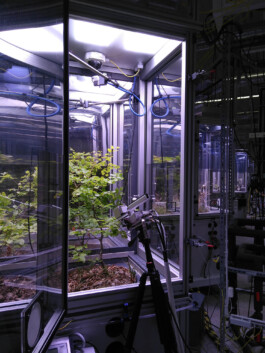



Research in mini-ecosystems
Ecotron of the German Centre for Integrative Biodiversity Research (iDiv) and the Environmental Research Center; Collaborative Research Center "AquaDiva", Plant Biodiversity Group, Institute of Ecology and Evolution, University of Jena
These high-tech mini-greenhouses are called Ecotrons. All environmental conditions of an ecosystem, such as light, temperature and precipitation, can be controlled in there. In this Ecotron, Dr Franziska Bucher is currently measuring the photosynthesis of a young beech tree. Since the beginning of the experiment, the tree has experienced a lot. With other beech trees, it was dug out of its forest along with 0.2 m³ of soil and transferred to the Ecotron. There, researchers from the collaborative research center "AquaDiva" simulate periods of drought and heavy rainfall events for the small trees and compare them with their conspecifics that had received regular precipitation. With the help of such controlled experiments, scientists can better predict the consequences of extreme weather conditions for our forests.
© Solveig Franziska Bucher

Research in mini-ecosystems
Ecotron of the German Centre for Integrative Biodiversity Research (iDiv) and the Environmental Research Center; Collaborative Research Center "AquaDiva", Plant Biodiversity Group, Institute of Ecology and Evolution, University of Jena
These high-tech mini-greenhouses are called Ecotrons. All environmental conditions of an ecosystem, such as light, temperature and precipitation, can be controlled in there. In this Ecotron, Dr Franziska Bucher is currently measuring the photosynthesis of a young beech tree. Since the beginning of the experiment, the tree has experienced a lot. With other beech trees, it was dug out of its forest along with 0.2 m³ of soil and transferred to the Ecotron. There, researchers from the collaborative research center "AquaDiva" simulate periods of drought and heavy rainfall events for the small trees and compare them with their conspecifics that had received regular precipitation. With the help of such controlled experiments, scientists can better predict the consequences of extreme weather conditions for our forests.
© Solveig Franziska Bucher